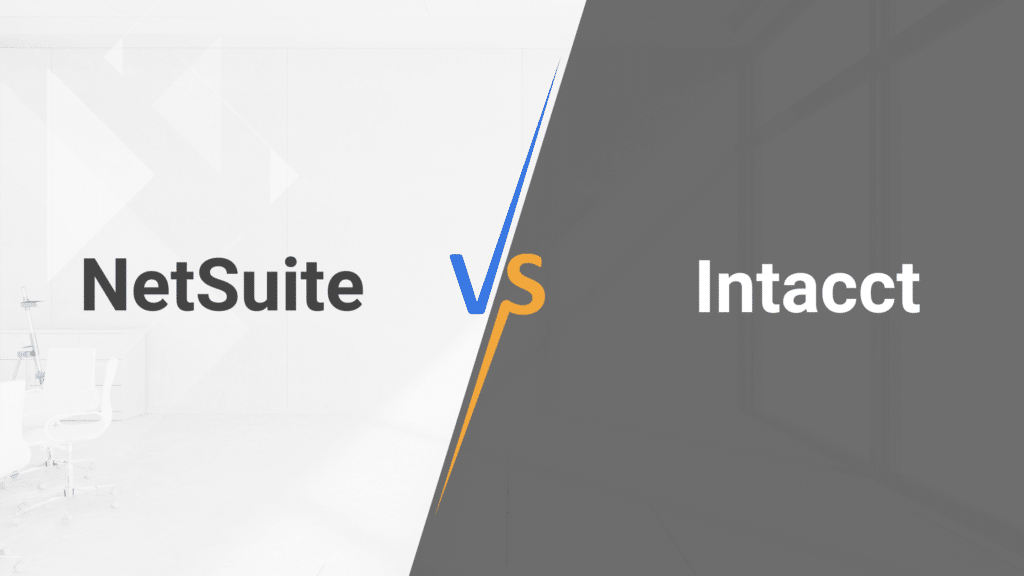Selecting the right Enterprise Resource Planning (ERP) software is essential for any business aiming to streamline its operations effectively.
NetSuite and Intacct are prominent players in the ERP market, each with unique features to manage various business functions.
This article explores a thorough comparison between these platforms, examining crucial elements like features, pricing, scalability, customer support, and tailored solutions for specific industries.
Partnering with Cumula 3, an expert in ERP solutions, ensures a seamless integration and maximization of your chosen ERP software’s capabilities.
We aim to provide businesses with the necessary information to choose the software that best meets their needs.
Understanding the differences and strengths of NetSuite and Intacct can greatly impact your decision, helping you choose a system that supports and enhances your business activities.
See how NetSuite can improve your business efficiency—book a personalized demo and get a tailored pricing estimate from Cumula 3 Group.
ALSO READ:
→ Understanding Costs and ERP Software Selection
→ Getting to Know NetSuite: A Practical Introduction
Exploring NetSuite
NetSuite, launched in 1998, quickly became a key player in cloud-based ERP solutions.
It now serves a broad spectrum of industries and boasts a significant presence in over 219 countries.
Here’s a closer look at what makes NetSuite a top choice for many businesses, with Cumula 3 ready to offer its expertise for a smooth implementation and optimized system performance:
- History and Market Position: Since its inception, NetSuite has grown to support over 37,000 customers worldwide, demonstrating its strong market presence and the trust businesses place in its capabilities.
- Core Offerings: NetSuite provides an all-in-one solution that covers essential business functions, including finance, customer relationship management (CRM), eCommerce, and supply chain operations. This integration helps streamline processes and improve efficiency.
- Targeted Business Types: The platform is versatile enough to benefit a range of businesses, from nimble startups to expansive enterprises. Its flexible nature makes it suitable for various sectors looking for a scalable and integrative approach.
- Global Reach and Scalability: With its cloud-based architecture, NetSuite is designed for global operations and offers seamless scalability. This makes it easy for businesses to expand into new markets without the need for significant additional investment in IT infrastructure.
- Single-Version Advantage: Thanks to its single-instance architecture, all users operate on the same version of NetSuite. This ensures businesses have access to the latest features, updates, and security enhancements, rolled out uniformly across all users.
By leveraging these features, NetSuite ensures that businesses manage their operations efficiently and are well-prepared for future growth and challenges.
ALSO READ:
→ Unlocking NetSuite’s Potential: Your Add-On Toolkit
→ The Expense of Operating Without Warehouse Management Software
Getting to Know Sage Intacct
Intacct, a prominent figure in the ERP community, has made significant strides since its foundation in the early 2000s.
Known for its commitment to cloud computing, Intacct has carved a niche for itself, especially among small to mid-sized businesses.
Here are the main aspects of Intacct:
- Background and Position: Intacct is well-regarded in the ERP sector for its focus on cloud-based solutions, which facilitate sophisticated financial management processes. Its reputation for innovation and user-friendly software has earned it a loyal following among finance professionals.
- Core Features: Intacct provides detailed financial management tools essential for comprehensive accounting needs. The platform includes functionalities such as advanced financial reporting, project accounting, and fund accounting. These tools are designed to enhance accuracy and improve financial oversight.
- Target Audience: Intacct primarily caters to small and medium-sized enterprises (SMEs). It is ideal for companies that need strong financial functionalities without the complexity of larger ERP systems. It is particularly popular among organizations in sectors like healthcare, professional services, and nonprofits, where detailed financial reporting and compliance are crucial.
- Compliance and Reporting: Intacct is celebrated for its robust compliance and reporting capabilities. It supports various regulatory requirements and standards, making it a trusted choice for businesses that require meticulous financial documentation and audit trails. Its capabilities ensure that companies meet their financial reporting obligations efficiently and accurately.
Through its focused approach to delivering high-quality financial management and compliance tools, Intacct provides a solid foundation for businesses looking to maintain precise financial controls and operational efficiency.
ALSO READ:
→ Top NetSuite Partners Revealed
→ NetSuite Implementation: Insider Advice
How NetSuite and Intacct Measure Up on Features
To clearly delineate NetSuite’s and Intacct’s strengths and capabilities, let’s examine a side-by-side comparison of key features.
This table will help businesses understand which software better aligns with their specific needs:
| Feature | NetSuite | Sage Intacct |
| Financial Management | Comprehensive financial operations tools include billing, revenue recognition, and financial planning. | Strong financial management with superior functionalities for accounts payable, accounts receivable, and cash management. |
| Reporting Capabilities | Extensive reporting with real-time data across all integrated functions, enhancing decision-making. | Robust financial reporting tailored to compliance and detailed financial analysis, with customizable dashboards. |
| Integration Options | Wide range of integration capabilities with other enterprise systems, facilitating seamless data flow and operations. | Offers integrations primarily focused on financial systems but also supports other business functions with third-party solutions. |
| Automation | High level of automation across business processes, reducing manual work and increasing efficiency. | Advanced automation in financial operations, particularly in project accounting and budget management. |
| Unique Features | Strong CRM integration that connects sales directly with other business processes for a unified approach. | Specialized in advanced project accounting, providing detailed control over project budgets and financials. |
1. Discussion of Unique Features
NetSuite’s CRM Integration
One of NetSuite’s standout features is its integrated CRM system, which links sales data directly with financial and inventory systems.
This integration provides a holistic view of customer interactions, sales forecasting, and business performance, making it easier for businesses to make informed decisions and drive growth.
Intacct’s Advanced Project Accounting
Intacct excels in project accounting, offering tracking and management of project costs and revenues.
This is particularly valuable for professional services and companies that manage multiple projects simultaneously, as it allows for meticulous control over budgets and financial reporting, ensuring projects stay on track and profitable.
2. Implementation Considerations
Implementing an ERP system like NetSuite or Intacct involves much more than simply choosing a software package.
Both being cloud-based solutions, they eliminate the traditional demands of on-premises systems such as installing and maintaining physical hardware and data centers.
However, the implementation process still presents challenges that could disrupt business operations if not managed correctly.
Thus, selecting a trusted partner experienced in ERP implementation is crucial.
| Customer Experience | NetSuite | Sage Intacct |
| Implementation Type | In-House Emphasis | Partner Emphasis |
| Implementation Price Model | Fixed Bid | Time and Expense |
| Depth of Integration Experience | ✓ | ✳ |
| Customer Engagement Methodology | ✓ | 𐄂 |
| Dedicated Account Management | ✓ | 𐄂 |
| Preconfigured Instance | ✓ | 𐄂 |
| Cloud Customer Community | ✓ | ✓ |
✓ = Native capabilities
✳ = Some capabilities or requires partner support
𐄂 = No native capabilities
The choice between NetSuite and Intacct will depend on the specific needs of a business, the desired speed of implementation, and the level of customization required.
NetSuite’s all-encompassing approach with SuiteSuccess is ideal for businesses looking for a rapid, tried-and-tested implementation strategy, while Intacct may appeal to those who prefer a partner-driven approach and possibly a more flexible pricing model.
3. Gartner Magic Quadrant Insights
NetSuite
Positioned as a Leader in the Gartner Magic Quadrant for Cloud ERP for Product-Centric Enterprises, NetSuite is recognized for its comprehensive functionality and broad market applicability.
Its ability to support a wide range of industries through scalable solutions highlights its leadership status. The platform’s continuous innovation and customer satisfaction scores underline its strong market presence and operational excellence.
Sage Intacct
While Sage Intacct is not typically highlighted in the Magic Quadrant for Cloud ERP for Product-Centric Enterprises, it holds a strong position in the quadrant for Cloud Financial Management Suites for Midsize, Large and Global Enterprises.
This distinction emphasizes Intacct’s strength in financial management and suitability for enterprises focused on financial processes rather than a broader ERP scope.
Source: Gartner (October 2023)
By comparing these key aspects and with Cumula 3 Group by your side, companies can gauge which ERP software—NetSuite or Intacct—better suits their operational needs and long-term business strategies.
ALSO READ:
→ NetSuite Implementation Expenses Deciphered
→ NetSuite Substitutes: Examining 15 Competing ERP Solutions
Mobile Support and Accessibility
With remote work and on-the-go business management, mobile support is essential for any ERP system.
However, there are notable differences in how each system enhances mobile accessibility.
NetSuite’s Mobile App
NetSuite offers a dedicated mobile app that is for free on iOS and Android platforms.
This app is designed to provide an optimized user experience on mobile devices, making it easier for employees to interact with the ERP system while on the move.
The advantages of NetSuite’s mobile app include:
- Enhanced User Experience: The app is tailored for mobile usage, improving navigation and readability over what’s typically available through mobile browsers. This aligns with trends showing that employees spend a significant majority of their mobile time using apps rather than browsers.
- Increased Security: As a native app, it must meet rigorous security standards set by app stores, ensuring data protection and safe access.
- Operational Efficiency: NetSuite’s app stores data locally, which can speed up data retrieval compared to mobile websites that rely on server connections.
- Offline Functionality: The app provides certain functionalities even without an internet connection, allowing users to view data and perform some actions offline.
Intacct’s Mobile Accessibility
Unlike NetSuite, Intacct does not have a dedicated mobile app. Instead, it encourages users to access the system via mobile browsers.
While this approach maintains accessibility, it lacks the enhanced features of a dedicated app:
- Consistent Access: Users can access Intacct from any device with a browser, ensuring universal access without the need to install an app.
- Dependence on Internet: Without a dedicated app, users must have an internet connection to perform all functions, as mobile browsers do not support extensive offline capabilities.
When considering mobile support in your ERP decision, it’s important to evaluate how your team uses mobile devices for business processes.
Choose the option that best aligns with your team’s mobility needs and workflow preferences.
ALSO READ:
→ Navigate NetSuite Account Reconciliation Like a Pro
→ Essential Food ERP Checklist
How NetSuite and Intacct Serve Different Industries
Choosing the right Enterprise Resource Planning (ERP) software often hinges on industry-specific needs.
NetSuite and Sage Intacct stand as two formidable ERP solutions, each offering specialized functionalities designed to cater to distinct vertical industries.
Here’s a closer look at how each software caters to specific sectors such as manufacturing, retail, and non-profit organizations:
NetSuite for Industry-Specific Needs
- Manufacturing: NetSuite provides manufacturers with a comprehensive suite of tools to manage everything from production to supply chain logistics. Features like real-time inventory management, production scheduling, and integrated financials help streamline operations and improve efficiency.
- Retail: For retailers, NetSuite offers a unified commerce platform that integrates eCommerce, POS, and order management with financials. This connectivity ensures consistent customer experiences across all sales channels, crucial for driving sales and customer loyalty.
- Non-Profit: Nonprofits benefit from NetSuite’s grant management, fund accounting, and donor management functionalities. These tools help organizations maintain transparency, manage budgets effectively, and comply with reporting requirements.
Intacct’s Tailored Offerings
- Manufacturing: Intacct aids manufacturers with its ability to handle complex pricing models, multidimensional inventory tracking, and streamlined procurement processes. Its strong financial management backbone supports detailed cost analysis and economic control.
- Retail: Intacct helps retailers manage their finances, offering capabilities for multi-location operations, including financial reporting and inter-entity transactions, essential for managing a growing retail business.
- Non-Profit: For non-profits, Intacct has features like fund accounting, grant tracking, and financial stewardship. These functionalities ensure that nonprofits can adapt to varying funding sources and regulatory environments while maintaining financial integrity.
Here are other industries that are catered by NetSuite and Sage Intacct:
| Industry | NetSuite | Sage Intacct |
| Financial Services | ✓ | ✓ |
| Software | ✓ | ✓ |
| Healthcare | ✓ | ✓ |
| Manufacturing | ✓ | |
| Retail and Ecommerce | ✓ | |
| Professional Services | ✓ | ✓ |
| Restaurants and Hospitality | ✓ | ✓ |
| Wholesale Distribution | ✓ | ✓ |
| Advertising, Media, and Publishing | ✓ | |
| Nonprofit | ✓ | ✓ |
| Transportation and Logistics | ✓ | |
| Construction and Real Estate | ✓ | ✓ |
Specialization in Microverticals: NetSuite also distinguishes itself by offering editions tailored for “microverticals” such as apparel, footwear and accessories, food and beverage manufacturing, health and beauty, and more.
These specialized solutions are designed to meet the nuanced requirements of these specific sectors, demonstrating NetSuite’s commitment to addressing diverse industry challenges.
Whether your business operates in financial services, healthcare, retail, or any other sector, choosing between NetSuite and Sage Intacct depends on your specific industry needs and the depth of functionality required.
By aligning your ERP selection with your industry’s unique demands, and with Cumula 3 leveraging its deep industry knowledge, you can ensure that your business not only manages its current operations efficiently but is also well-prepared for future growth and challenges.
ALSO READ:
→ Bob Scott’s Top 100 VARs 2023 Welcomes Cumula 3 Group
→ Choosing the Right ERP: Top 15 Features for Manufacturing
Conclusion – NetSuite vs Intacct
Choosing between NetSuite and Intacct is a pivotal decision that hinges on understanding each system’s strengths and aligning them with your specific business needs.
From our detailed comparison, it’s clear that both platforms offer robust capabilities tailored to enhance various aspects of business operations.
In conclusion, your final choice should reflect a thorough evaluation of your business’s specific requirements, future growth plans, and the primary functions you need your ERP system to perform.
Whether you lean towards the extensive, integrated capabilities of NetSuite or the focused, finance-oriented features of Intacct, ensure that the ERP solution you choose not only fits your current needs but is also capable of adapting to future business dynamics.
With the insights provided, you are better positioned to make a decision that will drive efficiency and support your business’s long-term success.
Cumula 3 is also here to guide you through this process, ensuring that the ERP solution you choose not only fits your current needs but is also capable of adapting to future business dynamics.
See how NetSuite can improve your business efficiency—book a personalized demo and get a tailored pricing estimate from Cumula 3 Group.






